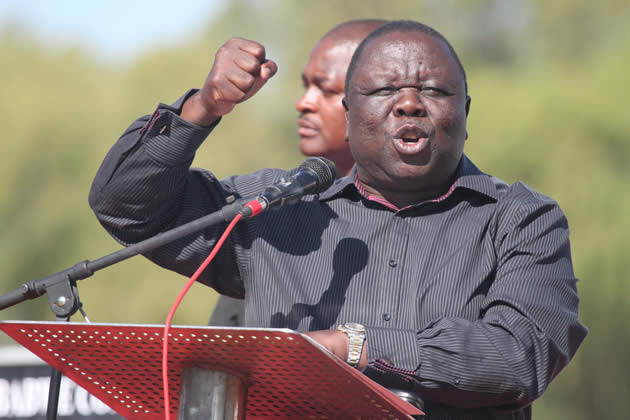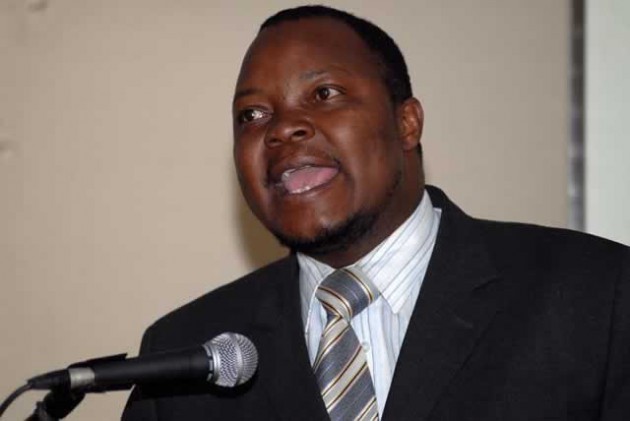MDC-T: Breaking the Myth

Nathaniel Manheru The Other Side
“We don’t want to build parties that have no future and that will die with me. If I lose the next election I will step down and pass the baton. That is democracy and continuity.” The year was 2012; the month was November. The place was Mkoba, right in the middle of this land of rock.
The interlocutors were the MDC-T provincial heavies of Midlands. And the speaker? Yes, you guess right, the speaker was Morgan Richard Tsvangirai, the man from Buhera, and for whom much always happens in November, the month of goats. Speaking from the heart of the country, we all thought his words issued from within his deep, democratic heart. Then, we were a good six-plus months away from the July 31 polls that would decide his political day, that would hold him up to his rather gratuitous pledge.
When the bolt gets rusty
Of course July 31 came, with it a whirlwind defeat that sat the MDC-T leader on his twos, never to stand, that left his mouth parched white, as if licked by a cold harmattan. Always an orphan, defeat stirred subversive thoughts and questions among his restless followers. In no time, the hiss of dissatisfaction turned into a yell of open dissent. The leader had failed the party. Not once, not twice, but on three consecutive occasions.
A rusty bolt, intoned Ian Kay, drawing his metaphor from his Rhodesian farming tradition. More caustic judgements from unhappy whites, themselves always a voice that matters and decides in MDC-T politics.
For they are the purse and thus owners of the pipe and piper. Or where they don’t have the purse, they are the third party that endorses the flow of resources. We all wondered where all this was building towards.
But not for long. Then came Mangoma’s blistering letter, taking on a false tone of profound advice from one so loyal, from one so well-meaning. Time to call quits, Mister President! Ordinarily, this would have been a very gentle reminder, what with what the leader had promised he would do in 2012, in the event of another defeat. Or so we all thought! How wrong!
You are free to leave!
The naked king would not take advice, roaringly telling Mangoma not to stand between a charging bear and its anger. Events became nimble, very fast paced and soon February 2014 arrived, with it new words from the same mouth. The leader had had a change of heart. The venue was Huruyadzo Shopping Centre (Remember Bishop Abel Tendekayi Muzorewa?), Chitungwiza: “Kana pane asingade kuita fall in line, be out of line . . . I have not run out of manpower but ndiri kuti kana muchida struggle yekuti uyai tiite change ngatibvisei Zanu-PF, let’s work together. But if you do not want to work with me, you are free to leave.” He went much further.
He asked his followers if they understood “democracy”, adding, “munezera nayo”? He left nothing in doubt. He was the god, the only one. The MDC-T supporters were there to dutifully follow, while he exercised his prerogative to lead. What would be MDC-T without Tsvangirai, he quipped, before breaking into a song of self-assurance, teaching violence always ready to be unleashed against dissent. The MDC-T’s much-vaunted values had gone up in smoke!
The votary goes wrong
When dissent comes from acolytes, the gods are always known to be swift and ruthless. And this is Mangoma’s mortal sin. He is an archangel that fell, an archangel that has deigned query the wisdom of the gods, that has dared measure the extent of their power. He shall be punished severely, flung into bottomless pit. Before this recklessness, he was the chief priest, magosva, the keeper of the secrets of the rites to MDC-T power.
We all knew that if you wanted to reach Tsvangirai’s mind, all you needed to do was to prod Mangoma. Before long, you would have it all, unadorned. This is the man who has now upset the applecart. There cannot be any forgiveness. Except Mangoma is just that, a mere drum whose song and tone depends on who beats it. Let us get to the hand that beats the drum.
Crystallising simmering white dissent
Everyone in the political world knows Mangoma as the “Hotspur” of MDC-T politics, the reckless tong that touches the hottest embers. Tsvangirai used him to good measure, including exposing him to reckless ministerial decisions during the inclusive Government. He suffered for it, all the time with ever mounting, amazing self-satisfaction. In him there has always been a strange will to self-flagellate. The MDC-T’s white supporters knew that, the same way they are also aware they will always need a bold, black face on which to plant their latest political calculations.
Mangoma’s letter is a crystallisation of simmering white dissent within the MDC-T, simmering dissent that needed a bold if not reckless actor. That white dissent could have used Biti, but knew quite well Biti is a thoughtful coward that Mangoma is not. In any case Biti would always come in with legal justification, after Hotspur would have acted impetuously. But Mangoma had to be backed by more reckless hands, possibly violent ones, which is where the young Madzore came in, eyes set on the equally impetuous youth wing of the MDC-T.
The demos versus elite reasoning
What the media have lost is the recognition that there is something inorganic about the Biti-Mangoma high-flown politics of dissent. They can’t unmake Morgan. As already stated, these are white politics relying on an elitist grasp of the tenets of democracy and legalism. They resonate with the thinking side of politics, which is why their proponents are lawyers, MDC-T’s white supporters, ambassadors and diplomats, never the average MDC-T supporter in Budiriro or Chitungwiza, himself the real mover and shaker of MDC-T politics.
Welshman benefited from the sheer ethnic resonance of his breakaway politics, the same way Mangoma and Biti never would. And Mangoma’s resort to the epistolary format, and to the boardroom setting for the espousal of his dissent against Tsvangirai spelt doom for his cause. His methodology only made sense to the thinking, to the boardroom where a jacket and tie are the appropriate attire. He mistook a jacket and shirt for armour, and that was fatal.
Tsvangirai read his enemies right. They belonged to the white world; their message was white, elitist. It had no resonance with the people for whom personality cult and loyalty counts for all. He mobilized the demos for an emphatic rebuttal of an esoteric argument, one so couched in learned phrases.
Into Tsvangirai’s arms
He opened the floodgates of Harvest House and the demos poured in, claws and fangs ready to maul the smart Alecs of clean politics. The act of tearing Mangoma’s clean shirt became a metaphor of the rejection of elitist politics so steeped in white patronage. And an emphatic illustration of the inherent vulnerability of those propped by such politics. The fangs of the lumpen would always claw the day. If Mangoma thought an image of him in torn shirt would mobilise support and sympathy, he was gravely mistaken. In politics violence has a totem. It is not always that it dignifies the victim. Rather, if well calibrated, it dignifies the haver.
Violent Tsvangirai carried the day. In the case of Mangoma, it was worse. Many see him in a display of yet another round of bravado. As for Biti the irony could not have been more dramatic: to survive the attack, he had to escape into, and embrace Tsvangirai! Outside Tsvangirai, there appears no political safety for him.
Citing chapter and verse
Both men have white politics and white money. They don’t have the rabble that moves politics. And Tsvangirai knew all this, which is why his response continues to move farther and farther away from the boardroom, the constitution, more and more towards the townships where the rules are written by the rabble, in plumes of dust. By so doing, he has dared his opponents to show their real worth by way of popular support.
They can’t match him. They have not organised a single rally, with their supporters getting haunted out, one by one. In place of slogans of the masses, they continue to cite chapter and verse from a dead constitution. The Bismarckian notion that great questions of the day are settled not by speeches and resolutions, but by blood and iron, has never rang truer.
Into ZANU-PF’s value system
There is another dimension. Tsvangirai today parades like the keeper of the soul of the MDC-T. And the MDC-T soul is threatened by the meddlesome West, the same West which Zanu-PF attacks daily. That way he has tapped into an argument which Zanu-PF has turned into a shibboleth of national politics, turned into a veritable test of political legitimacy. Today many in Zanu-PF view Tsvangirai as gravitating towards a cardinal political value: that of resisting the West’s intrusive politics and Mephistophelian temptation. We all heard that some figure of US$3million had been placed on the table to tempt Tsvangirai away from leadership. All this is seen as symbolising Mangoma-Biti’s degraded, pro-west politics. The framing has been more than damning.
When candor is naïveté
To all that add Biti’s fatal address at Sapes Trust, an address which has been framed as suggesting that Biti is getting is support from Zanu-PF. Of course all that is nonsense. Except as a politician he should have known that in politics, honesty and candour amount to naïveté. There is nothing which Biti said at Sapes which is untoward.
Or even brilliant. He stated the obvious, but at the wrong time. His opponents were hungry for that link, however tenuous, which would fasten him to Zanu-PF. Such a link would stoke emotions, themselves the brick and mortar of rabble politics. He supplied exactly that, thereby allowing himself into a conversation that he would not win.
Declining middle class appeal
Which means what from the point of view of national politics? Well, Zanu-PF’s victory continues to spawn real contradictions within the bedrock of white politics in Zimbabwe. The false democratic value system upon which these politics have always been predicated has now collapsed.
Violence has been unleashed yet again, in the process putting a lie to the notion that the MDC-T has always been the victim of political violence. It has been such a potent mobilising myth which has now collapsed, having been twice tested, twice failed.
Secondly, the West always needed a coherent entrepôt for its intrusive politics, something which the now fragmenting MDC-T so ill-supplies. And as is turning out, each split takes from MDC-T its thinking side, leaving Tsvangirai more and more reliant on brawn. That bodes ill for national politics. What is significant is not Mangoma-Biti’s lack of public face; it is the MDC-T’s declining middle-class appeal.
Nowhere is this more illustrated than by the substitution of Mangoma/Biti by Job Sikhaka. Thirdly, Tsvangirai’s I-still-have-support rallies have thrown spotlight on the state of MDC-T support after the July 31 defeat. That support has dwindled drastically. All his rallies really struggled to make an impression in terms of national politics. Long after Biti and Mangoma are silenced, Tsvangirai shall discover his slide has accelerated as never before.
The key challenge has never been to unmake Biti and Mangoma; it has always been to remake the MDC-T after July 31. Even where the economy is failing, an MDC-T without the confidence of the elites is dead capital.
In the meantime, Zanu-PF will continue to push for Zim-Asset, not so much for its real value but as a convenient rallying point while real gains are notched on empowerment and value addition.
Icho!












Comments